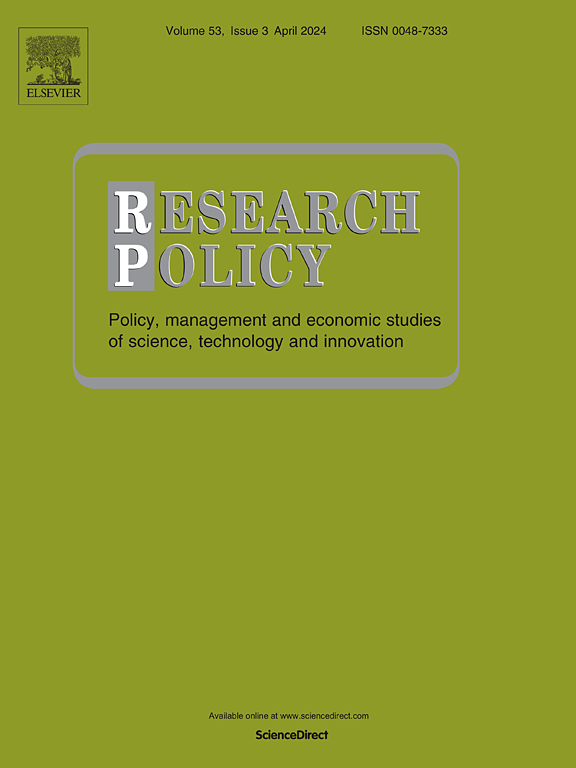当公民判断科学:模式二知识生产中的群体评价
IF 8
1区 管理学
Q1 MANAGEMENT
引用次数: 0
摘要
新兴的众包和众筹机制使公民能够决定哪些研究项目应该得到资助。通过从专业科学家手中转移控制权,这些机制反映了向更开放的“模式2”知识生产的更广泛转变,这种转变允许非学术利益相关者塑造科学的方向。虽然这可能会导致人们更加重视研究的社会影响,但没有系统的证据表明,群体评估者如何权衡社会影响与其他标准(如科学价值或团队资格)之间的关系。还有人担心,与众筹相关的个人财务成本会阻止某些社会经济群体参与,从而降低意见的代表性。同样,也不清楚公民对特定话题的个人兴趣在形成他们的评价方面发挥了什么作用。我们利用2300多名人群评估者的数据提供了经验证据,他们评估了四个不同领域的研究提案,并可以通过众包机制(即推荐)和众筹机制(即捐赠)表达他们的支持。我们确认,人群评估者给予显著的权重感知社会影响,虽然这个权重不大于科学价值。与众包相比,众筹给了高收入、高教育程度的公民更大的发言权。个人对某一主题的兴趣往往与更大的项目支持有关,这可能部分反映了对社会影响的夸大评估。尽管有这些一般的模式,我们也观察到项目之间的差异——说明了使开放模式2过程难以预测和控制的上下文特异性和可变性。本文章由计算机程序翻译,如有差异,请以英文原文为准。
When citizens judge science: Crowd evaluations in Mode 2 knowledge production
Emerging crowdsourcing and crowdfunding mechanisms enable citizens to decide which research projects should be funded. By transferring control from professional scientists, these mechanisms reflect a broader shift towards more open “Mode 2” knowledge production that allows non-academic stakeholders to shape the direction of science. Although this may lead to a greater emphasis on the social impact of research, there is no systematic evidence on how crowd evaluators weigh social impact relative to other criteria such as scientific merit or team qualifications. There are also concerns that the personal financial costs associated with crowdfunding prevent certain socio-economic groups from participating, reducing the representativeness of opinions. Similarly, it is not clear what role citizens’ personal interest in particular topics plays in shaping their evaluations. We provide empirical evidence using data from over 2,300 crowd evaluators who assessed four research proposals in different fields and could express their support using a crowdsourcing mechanism (i.e., recommendation) and a crowdfunding mechanism (i.e., donation of own money). We confirm that crowd evaluators give significant weight to perceived social impact, although this weight is not larger than that of scientific merit. Compared to crowdsourcing, crowdfunding gives greater voice to citizens with higher income and education. Personal interest in a topic tends to be associated with greater project support, which may partly reflect an inflated assessment of social impact. Despite these general patterns, we also observe differences across projects – illustrating context-specificity and variability that make open Mode 2 processes difficult to predict and control.
求助全文
通过发布文献求助,成功后即可免费获取论文全文。
去求助
来源期刊

Research Policy
MANAGEMENT-
CiteScore
12.80
自引率
6.90%
发文量
182
期刊介绍:
Research Policy (RP) articles explore the interaction between innovation, technology, or research, and economic, social, political, and organizational processes, both empirically and theoretically. All RP papers are expected to provide insights with implications for policy or management.
Research Policy (RP) is a multidisciplinary journal focused on analyzing, understanding, and effectively addressing the challenges posed by innovation, technology, R&D, and science. This includes activities related to knowledge creation, diffusion, acquisition, and exploitation in the form of new or improved products, processes, or services, across economic, policy, management, organizational, and environmental dimensions.
 求助内容:
求助内容: 应助结果提醒方式:
应助结果提醒方式:


